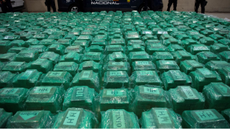The immigration fallacy
Here is what Toronto is not: Toronto is not dirty, dangerous, or poor. Toronto is not a hell of lost liberties or a babble of cultural incoherence or a ruin of failed institutions. Yet a popular argument against high levels of immigration suggests it should be.
In his 2004 book Who Are We?: The Challenges to America's National Identity, the late Harvard political scientist Samuel Huntington warned that "the United States of America will suffer the fate of Sparta and Rome," should its founding Anglo-Protestant culture continue to wane. Commenting sympathetically on Huntington's argument, conservative writer John O'Sullivan asserts that if traditional patterns of national life are "removed or destroyed, then anomie, despair, and disintegration tend to be among the consequences." So we must take care to protect our precious cultural patrimony from the acid of "denationalizing" economic and cultural globalization. We must keep outsiders out.
Successful societies (so this argument goes) owe their liberty and prosperity to distinct institutions which, in turn, depend on the persistence and dominance of the culture that established and nurtured them. Should that culture fade—or become too diluted by the customs, religions, and tongues of outsiders—the foundation of all that is best and most attractive about that society cannot long last.
Subscribe to The Week
Escape your echo chamber. Get the facts behind the news, plus analysis from multiple perspectives.

Sign up for The Week's Free Newsletters
From our morning news briefing to a weekly Good News Newsletter, get the best of The Week delivered directly to your inbox.
From our morning news briefing to a weekly Good News Newsletter, get the best of The Week delivered directly to your inbox.
But somebody forgot to tell Toronto! Nearly half the denizens of Canada's most populous metropolis were born outside the nation's borders—47 percent according to the 2006 census, and the number is rising. This makes Toronto, the fifth biggest city in North America, also the most diverse city in North America. Neither Miami, nor Los Angeles, nor New York City can compete with Toronto's cosmopolitan credentials.
Here is what Toronto is: the fifth most livable city in the world. So said the Economist Intelligence Unit in a report last year drawing on indicators of stability, health care, culture, environment, education, and infrastructure. (The Economist's world champion of livability, Vancouver, harbors a treacherous 40 percent foreign-born population.) Toronto is wealthy, healthy, well-educated, and much safer than any sizable American city. In 2006, its murder rate was 2.6 per 100,000 residents, which makes it less than half as deadly as Des Moines. The most culturally mixed city on the continent truly is one of Earth's closest approximations of urban paradise.
Of course, Canada's legacy of slavery and segregation is far less brutal and defining than is America's. And Canada does not share a long border with a much poorer country, millions of whose people will cross it looking for opportunity no matter what the law says. High levels of low-skilled immigration from Mexico and Central America create real problems in the United States, and Americans are right to worry about them. But these problems have solutions (guest-worker programs, not walls) and imply nothing about the general viability of healthy immigrant-rich societies.
The United States, this fabled land of immigrants, has fallen dismally far behind countries like Australia and Canada in openness to immigration. The Statue of Liberty may as well be moved to Vancouver's English Bay where the "huddled masses yearning to breathe free" are now rather more welcome than in New York Harbor. Many Americans, convinced by arguments like Samuel Huntington's, have come to believe that the institutions we so rightly cherish are too dependent on a feeble, endangered cultural inheritance to survive the bustling presence of strange languages, exotic gods, and pungent foods. That cultural fragility argument is false, and it deserves to die.
Sign up for Today's Best Articles in your inbox
A free daily email with the biggest news stories of the day – and the best features from TheWeek.com
Toronto, which has an Anglo-Protestant heritage as strong as any, has proved it dead wrong. In fact, Toronto shows that a community and its core institutions can not only survive a massive and growing immigrant population but thrive with one. Multicultural Toronto and cities like it prove that the institutions of liberal modernity are robust. Life within them is so good that people the world over flock to them. And newcomers do not take these institutions for granted. They have a stake in seeing them last. They can and do make them stronger.
None of this is to say that Toronto doesn't have its problems. (Or that it’s not boring to New Yorkers.) But we would do well to learn the lessons of cultural accommodation and integration from our neighbors to the north. American cities could host much larger immigrant populations and thrive. Maybe someday an American city will place in the top 10 on the list of the world's most livable places. Maybe—if it becomes more like Toronto.
-
 The Spanish cop, 20 million euros and 13 tonnes of cocaine
The Spanish cop, 20 million euros and 13 tonnes of cocaineIn the Spotlight Óscar Sánchez Gil, Chief Inspector of Spain's Economic and Tax Crimes Unit, has been arrested for drug trafficking
By The Week UK Published
-
 5 hilarious cartoons about the rise and fall of Matt Gaetz
5 hilarious cartoons about the rise and fall of Matt GaetzCartoons Artists take on age brackets, backbiting, and more
By The Week US Published
-
 The future of X
The future of XTalking Point Trump's ascendancy is reviving the platform's coffers, whether or not a merger is on the cards
By The Week UK Published
-
 US election: who the billionaires are backing
US election: who the billionaires are backingThe Explainer More have endorsed Kamala Harris than Donald Trump, but among the 'ultra-rich' the split is more even
By Harriet Marsden, The Week UK Published
-
 US election: where things stand with one week to go
US election: where things stand with one week to goThe Explainer Harris' lead in the polls has been narrowing in Trump's favour, but her campaign remains 'cautiously optimistic'
By Harriet Marsden, The Week UK Published
-
 Is Trump okay?
Is Trump okay?Today's Big Question Former president's mental fitness and alleged cognitive decline firmly back in the spotlight after 'bizarre' town hall event
By Harriet Marsden, The Week UK Published
-
 The life and times of Kamala Harris
The life and times of Kamala HarrisThe Explainer The vice-president is narrowly leading the race to become the next US president. How did she get to where she is now?
By The Week UK Published
-
 Will 'weirdly civil' VP debate move dial in US election?
Will 'weirdly civil' VP debate move dial in US election?Today's Big Question 'Diametrically opposed' candidates showed 'a lot of commonality' on some issues, but offered competing visions for America's future and democracy
By Harriet Marsden, The Week UK Published
-
 1 of 6 'Trump Train' drivers liable in Biden bus blockade
1 of 6 'Trump Train' drivers liable in Biden bus blockadeSpeed Read Only one of the accused was found liable in the case concerning the deliberate slowing of a 2020 Biden campaign bus
By Peter Weber, The Week US Published
-
 How could J.D. Vance impact the special relationship?
How could J.D. Vance impact the special relationship?Today's Big Question Trump's hawkish pick for VP said UK is the first 'truly Islamist country' with a nuclear weapon
By Harriet Marsden, The Week UK Published
-
 Biden, Trump urge calm after assassination attempt
Biden, Trump urge calm after assassination attemptSpeed Reads A 20-year-old gunman grazed Trump's ear and fatally shot a rally attendee on Saturday
By Peter Weber, The Week US Published